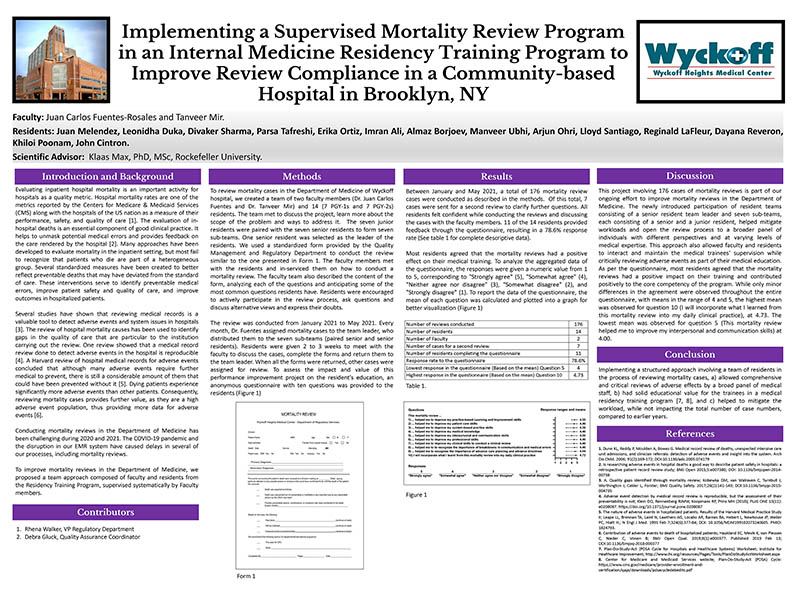
Hover to pan and click to magnify. Click again to pan at full screen.
Residents: Juan Melendez, Leonidha Duka, Divaker Sharma, Parsa Tafreshi, Erika Ortiz, Imran Ali, Almaz Borjoev, Manveer Ubhi, Arjun Ohri, Lloyd Santiago, Reginald LaFleur, Dayana Reveron, Khiloi Poonam, John Cintron.
Faculty: Juan Carlos Fuentes-Rosales and Tanveer Mir.
Scientific Advisor: Klaas Max, PhD, MSc, Rockefeller University.
Residents: Juan Melendez, Leonidha Duka, Divaker Sharma, Parsa Tafreshi, Erika Ortiz, Imran Ali, Almaz Borjoev, Manveer Ubhi, Arjun Ohri, Lloyd Santiago, Reginald LaFleur, Dayana Reveron, Khiloi Poonam, John Cintron.
Faculty: Juan Carlos Fuentes-Rosales and Tanveer Mir.
Scientific Advisor: Klaas Max, PhD, MSc, Rockefeller University.
Wyckoff Heights Medical Center
ABSTRACT:
Evaluating inpatient hospital mortality is an important activity for hospitals as a quality metric. Hospital mortality rates are one of the metrics reported by the Centers for Medicare & Medicaid Services (CMS) along with the hospitals of the US nation as a measure of their performance, safety, and quality of care [1]. The evaluation of in-hospital deaths is an essential component of good clinical practice. It helps to unmask potential medical errors and provides feedback on the care rendered by the hospital [2]. Many approaches have been developed to evaluate mortality in the inpatient setting, but most fail to recognize that patients who die are part of a heterogeneous group. Several standardized measures have been created to better reflect preventable deaths that may have deviated from the standard of care. These interventions serve to identify preventable medical errors, improve patient safety and quality of care, and improve outcomes in hospitalized patients.
Several studies have shown that reviewing medical records is a valuable tool to detect adverse events and system issues in hospitals [3]. The review of hospital mortality causes has been used to identify gaps in the quality of care that are particular to the institution carrying out the review. One review showed that a medical record review done to detect adverse events in the hospital is reproducible [4]. A Harvard review of hospital medical records for adverse events concluded that although many adverse events require further medical to prevent, there is still a considerable amount of them that could have been prevented without it [5]. Dying patients experience significantly more adverse events than other patients. Consequently, reviewing mortality cases provides further value, as they are a high adverse event population, thus providing more data for adverse events [6].
Conducting mortality reviews in the Department of Medicine has been challenging during 2020 and 2021. The COVID-19 pandemic and the disruption in our EMR system have caused delays in several of our processes, including mortality reviews.
To improve mortality reviews in the Department of Medicine, we proposed a team approach composed of faculty and residents from the Residency Training Program, supervised systematically by Faculty members.

DISQUS COMMENTS WILL BE SHOWN ONLY WHEN YOUR SITE IS ONLINE